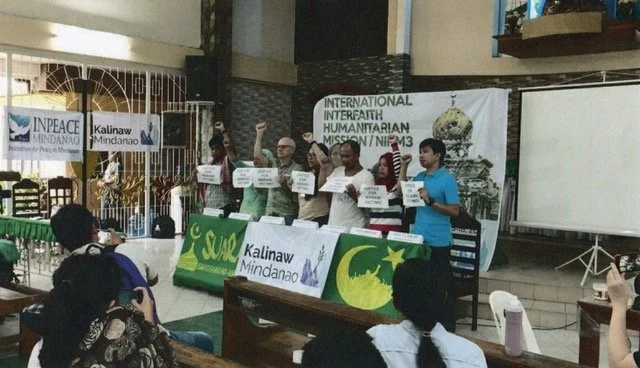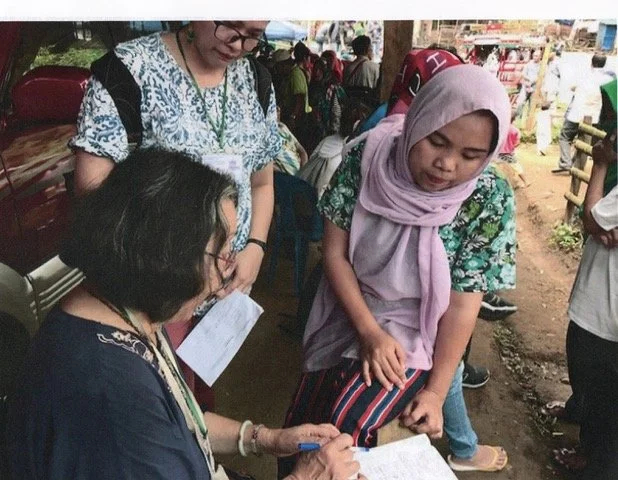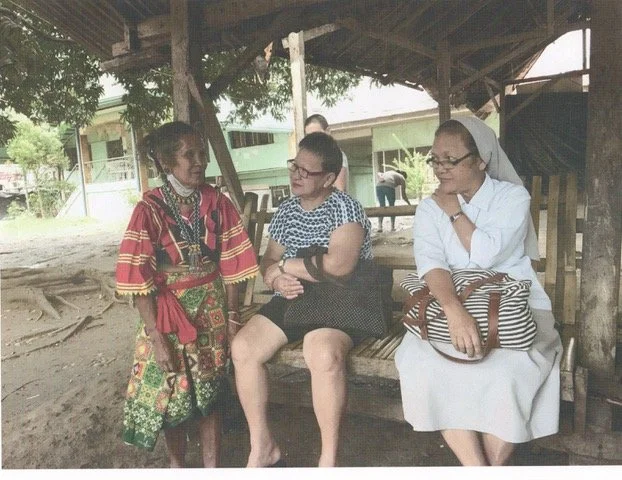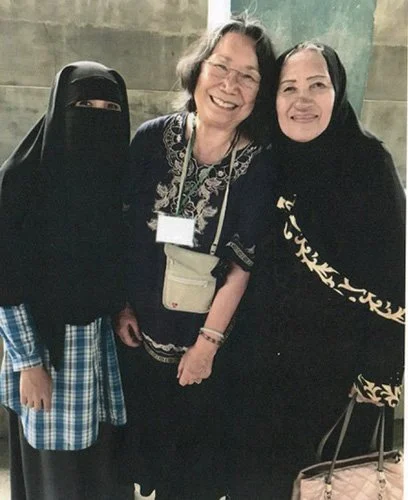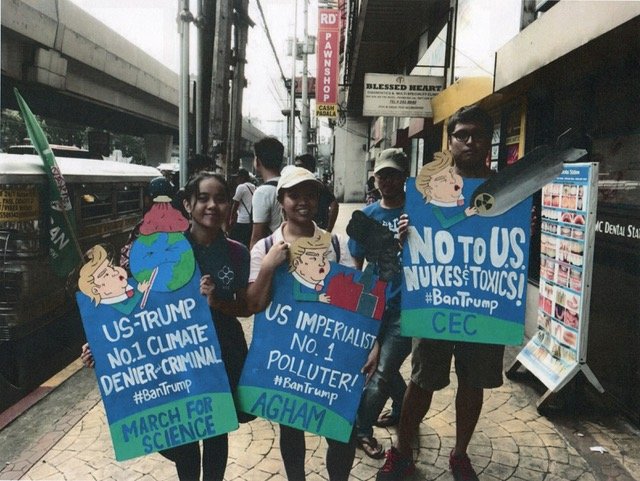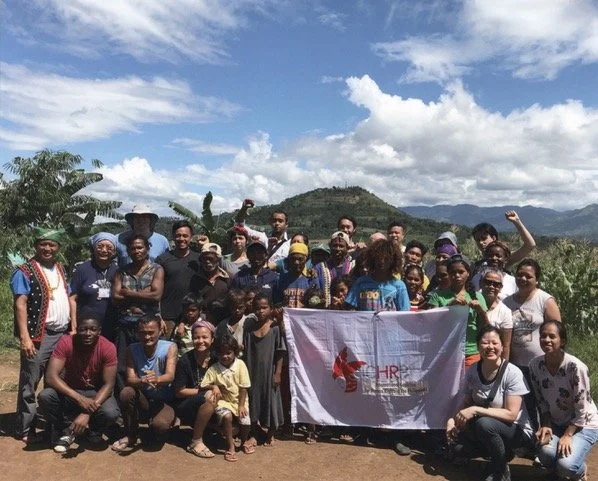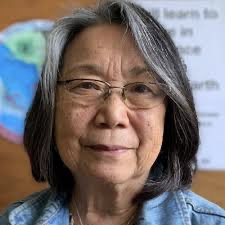Philippines: Forever in My Heart
/Press conference after our mission visited with residents of Marawi who were forced to flee (Photo by Pamela Tau Lee)
Documenting incidents of human rights abuse (Photo courtesy of Pamela Tau Lee)
We arrived at the UCCP Haran, Bakwit Evacuation Center in Davao City where I met and helped document the human rights abuses suffered by a mother and daughter who, along with the father, had owned a small grocery store. When the airstrikes began, the parents were working in their store and the daughter was at school. Immediately, the mother raced to the school in search of her daughter, but the students were already being evacuated. She returned to the store, and with her husband they quickly packed up what they could and joined the thousands leaving Marawi on foot. Sadly, the husband was in very poor health and could not endure the days of traveling and died from a heart attack. The mother continued alone and it was at the Haran evacuation center where she was reunited with her daughter.
Members of our interfaith delegation meeting with Lumad elder at Haran center (Photo by Pamela Tau Lee)
Met so many mothers and daughters forced to leave their homes and live in evacuation centers (Photo courtesy of Pamela Tau Lee)
Children at one of the evacuation centers in class working on an assignment (Photo by Pamela Tau Lee)
They were able to travel back to Marawi, hoping to be able to return and resume living there again. Instead, they found that Duterte’s troops had looted and physically destroyed their home and store. They reluctantly returned to the evacuation center. Via an interpreter, I fought back tears as I struggled to write. When we finished, we embraced for a very long time, and the daughter thanked me for the comfort it brought them to be able to share their story and offer concrete suggestions for what evacuees would need to face in the future. These include full compensation for the losses of their possessions, homes and businesses; medical and mental health services; the rebuilding of schools; dropping of charges against individuals “red tagged” (the state’s practice of labeling activists “communist terrorists” to justify repression against them).. To this day, I wonder and hope that they are well and have safely settled in a community place they can call home and that their reparation needs have been met.
During the turbulent times of the late 1960’s I was in college, organizing for Asian Studies and volunteering in SF Chinatown and at the International Hotel. I became active in trying to stop the eviction of the elderly Filipino tenants, and I also joined the struggle against the Marcos dictatorship and martial law. I learned that the US had economic and military interests in the Philippines. By the early ‘70s the US controlled 75 percent of all foreign investment.
The region of Mindanao is rich in fertile soil, natural resources oil, gas, gold, limestone, copper and forests. During our ten-day mission, we met with environmental land defenders who put their lives and human rights on the line to stop the plunder by local and foreign mining and agricultural entities, which included major multinational US corporations. Philippine military presence and operations provided security, with the US providing resources such as weapons and other equipment, training, surveillance data, US drones and troop deployment during the assault on Marawi.
One of many publications who ran our story about Marawi (Photo by Pamela Tau Lee)
Where there is exploitation and oppression, there is resistance and resiliency. I met many leaders whose lives were in constant danger, including Fritzi M, a volunteer teacher and administrator with the Save our Schools network, which includes 215 Lumad community-based schools where the youth learn traditional farming practices. Students also learn math skills so that they can negotiate fair prices for their parents’ crops. What makes these schools unique is that students learn to read, write and understand the law so that they can protect their sacred forests from being logged, resources from being extracted and farms from becoming hydropower plants or seized by large plantation conglomerates. Because of this, Fritzi and other teachers, parents, tribal leaders and supporters of the schools have been labeled as terrorists, many have been killed and 27 schools had to close due to intensifying military activities both inside the classroom and outside the schools.
In February 2022, Lumad school teachers Chad Booc and Gelejurain Nguho II, community health worker Elegyn Balonga and two drivers were brutally killed by the 10th Infantry Division of the Armed forces of the Philippines. The perpetrators claimed that the five individuals were members of the New People’s Army. Calls for an impartial investigation were issued by Senators de Lima and Pangilingan, Representatives Colmenares, the University of Philippines, International Coalition for Human Rights in the Philippines. Protests were led by the Student Christian Movement of the Philippines, Anakbayan, the League of Filipino Students, IBON Foundation and the International Coalition for Human Rights in the Philippines (ICHRP). To date, no impartial investigations have been conducted.
One of many young people groups in the streets protesting DUTERTE/TRUMP visits and talks (Photo by Pamela Tau Lee)
During the last six months of the Duterte regime and into the first six months of Ferdinand Marcos Jr.’s term, there were disturbing violations of internationally established human rights, including 324 killings,15 cases of extrajudicial killings (excluding drug-related cases), 9,000 forced evacuations, 156 illegal arrests without detention, 30 illegal arrests with detention, over 3,000 indiscriminate firings, and over 350,000 cases of threat, harassment and intimidation. (Under the regime of Marcos Senior, human rights abuses included 3,200 killings, 35,000 acts of torture, and 70,000 cases of incarceration.)
After being hosted by residents at Kisante, Makilala, we learned that armed police arrived. Fortunately, the villagers had already been tipped off by neighbors and found safe refuge in the forest. I was stunned that these families and leaders would risk their lives in order for us to learn about the horrors of living under the Duterte regime.
At our going away party I met and conversed with young adults with whom I had the privilege of marching while protesting the visit of Donald Trump. I wanted to learn what their hopes were for the future. What I heard was truly inspiring. Youth were studying to be environmentalists, journalists, community health workers, cultural workers, etc. The overarching sense I got was their commitment to and organizing for national democracy. While the struggle will be a long, protracted one, I have complete faith that the hope and dreams of these young people will come to fruition.
After everyone left, Eufemia, an elder leader from the local community, was cleaning up. I asked her what she would want me to do when I returned home. Her reply: “I hope that the American people will continue to find out what is happening in the Philippines; that they will come to understand that it is the American government that controls the economic, political and culture in the Philippines. I hope that we are helping each other to stop these systems… because the poor people are suffering a very hard life because of this.”
When I returned, I participated in the Stop the Killings National Peace Tour, which was launched in Washington, D.C. Attendees wanted to know how they could be in solidarity. The founding of a US chapter of the International Coalition for Human Rights in the Philippines was in the works. ICHRP-US would be a part of a global network of organizations based outside of the Philippines, committed to campaigning for human rights and Filipino people’s rights. ICHRP would receive and share news and action related to peace and human rights in the Philippines; join lobby visits and advocacy campaigns related to ending US military aid and intervention in the Philippines until there is accountability for the human rights violations; send representatives to the Philippines for human rights reality tours, solidarity and fact finding missions, and international conferences.
ICHRP - US delegation meeting with Lumad in Mindanao (Photo by Pamela Tau Lee)
When members of the formation committee asked if I would be the chairperson, I accepted without hesitation. I am very proud of the work of ICHRP. Our calls are to Stop the Killings in the Philippines! Never Again to Fascist Dictatorship in the Philippines! Solidarity is our Duty! Concretely, I ask that you, your friends and family support the various “asks” described below. You can get details by going to the ICHRP facebook page and <ichrpus.org> :
PHRA July 13-14 lobby days D.C and local
No to APEC Counter-Summit and Action in Seattle July 29-30 and San Francisco November 2023
Support the Save Our Schools Network
Release Leila de Lima and all political prisoners
Justice for Brandon Lee
Join ICHRP-US
Pam Tau Lee, chairperson International Coalition for Human Rights in the Philippines-US, five decades of organizing labor, community, internationalist elder.


